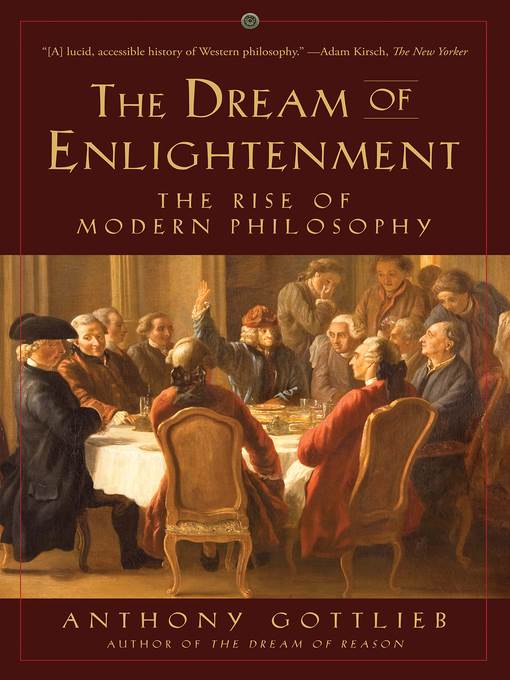
The Dream of Enlightenment
The Rise of Modern Philosophy
کتاب های مرتبط
- اطلاعات
- نقد و بررسی
- دیدگاه کاربران
نقد و بررسی

June 20, 2016
Gottlieb (The Dream of Reason), a former executive editor of the Economist, takes on the difficult task of trying to figure out what exactly the Enlightenment’s greatest thinkers were thinking, and to describe their thoughts in lay terms. He draws on intellectual, political, and scientific developments in Europe from the 1630s to the French Revolution. Gottlieb begins with Descartes and progresses through Hobbes, Spinoza, Locke, Bayle, Leibniz, and Hume, concluding with Voltaire, Rousseau, and the Philosophes. Gottlieb skillfully juggles the biographical eccentricities of the philosophers and their enormous paper flow (some one million pages for Leibniz alone), but he takes on too much when he tries to show how these men, largely ill at ease with their peers and religious institutions, have been mishandled by such later thinkers as Kant and Pope John Paul II. The book overflows with information, but chapters could be better organized internally. Moreover, Gottlieb’s writing can feel dull and uninspired given the material and his array of insights, including Locke’s defense of serfdom and colonialism, and his possible theft of his theory on private property from a friend; Spinoza’s influence on Einstein; and Hobbes’s conviction that rational man would seek self-preservation and peace. The book has flaws, but Gottlieb’s knowledge makes it worth reading.

June 1, 2016
A lively collective portrait of daring intellectuals.In this second volume of a planned trilogy on the history of philosophy, former Economist executive editor Gottlieb (The Dream of Reason: A History of Philosophy from the Greeks to the Renaissance, 2001, etc.) examines influential thinkers from the 1630s to the late 18th century, including Descartes, Hobbes, Spinoza, Locke, Leibniz, Hume, and two "unlikely bedfellows" buried opposite one another in the crypt of the Pantheon in Paris: Voltaire and Rousseau. Surprisingly to some, writes Gottlieb, "all these men were amateurs" who questioned the implications of new scientific and religious ideas for self and society. The well-born Descartes was "fascinated by machines and all kinds of mechanical contraptions." Hobbes, "the most vilified thinker in Britain," was an irascible man whose writings included "tirades against Aristotle and scholasticism" and attacks on academics and theologians. "Above all," writes Gottlieb, "it was probably Hobbes's materialism...that made him an anathema." Like Descartes, Hobbes regarded nature as a machine, but he took the idea further, maintaining "that absolutely everything is physical." Gottlieb sees much of Hobbes in the works of Locke and Hume, as well. Spinoza, excommunicated from the synagogue, "treated the Bible as a collection of documents that reveal as much about their authors as about anything else," best examined "with the tools of a literary critic and historian." Locke, according to Gottlieb, laid down the precepts of British empiricism, whose later exemplars included John Stuart Mill, Bertrand Russell, and A.J. Ayer. Pierre Bayle, a French philosophy professor, argued against religious superstitions such as the belief that comets were divine warnings, and his work focused on religious tolerance and "the so-called problem of evil." Gottlieb reveals how his subjects were esteemed or derided by their contemporaries and also how their ideas filtered down to later generations. The Enlightenment, the author convincingly asserts, set the ground for toleration of religious dissent, scientific progress, and the dismantling of feudalism. Engaging, accessible, and informative.
COPYRIGHT(2016) Kirkus Reviews, ALL RIGHTS RESERVED.

June 15, 2016
Gottlieb (former executive editor, the Economist) provides a sequel to The Dream of Reason: A History of Philosophy from the Greeks to the Renaissance. Here, there are individual chapters on Rene Descartes, Thomas Hobbes, Baruch Spinoza, John Locke, Pierre Bayle, Gottfried Wilhelm Leibniz, David Hume, and other French philosophers. Gottlieb attempts to understand "these pioneers" by "step[ping] back into their shoes." He unpacks their major philosophical ideas from within the contexts of their lives and times and also traces their subsequent scholarly receptions. No small task, but one accomplished with delightfully economical prose. British philosophers get the most attention, with the longest chapters going to Hobbes, Locke, and Hume. And while Gottlieb acknowledges that "all histories of philosophy are selective," his might advantageously have included more on another Brit, Francis Bacon. That would have allowed highlighting inductive thinking to accompany Descartes's rationalism, even if Gottlieb is right that Bacon was not the stock empiricist he's often made out to be. We should all look forward to his projected next volume, taking philosophy's story forward from Immanuel Kant. VERDICT An accessible introduction to Enlightenment philosophers with much to offer all educated readers. [See Prepub Alert, 2/29/16.]--Mark Spencer, Brock Univ., St. Catharines, Ont.
Copyright 2016 Library Journal, LLC Used with permission.

March 15, 2016
A former executive editor of the Economist who has held visiting fellowships at Harvard University and All Souls College, Oxford, Gottlieb won raves for The Dream of Reason, a history of philosophy from the Greeks to the Renaissance. Finally, after 16 years, we have the sequel, which focuses on the key philosophers Descartes, Hobbes, Spinoza, Locke, Leibniz, Hume, and Rousseau, who rethought thinking itself as Galilean science challenged previously held assumptions and religious beliefs. Accessibly written philosophical studies can be surprisingly popular as evidenced by the current success of Sarah Bakewell's At the Existentialist Cafe. Don't miss.
Copyright 2016 Library Journal, LLC Used with permission.

























دیدگاه کاربران